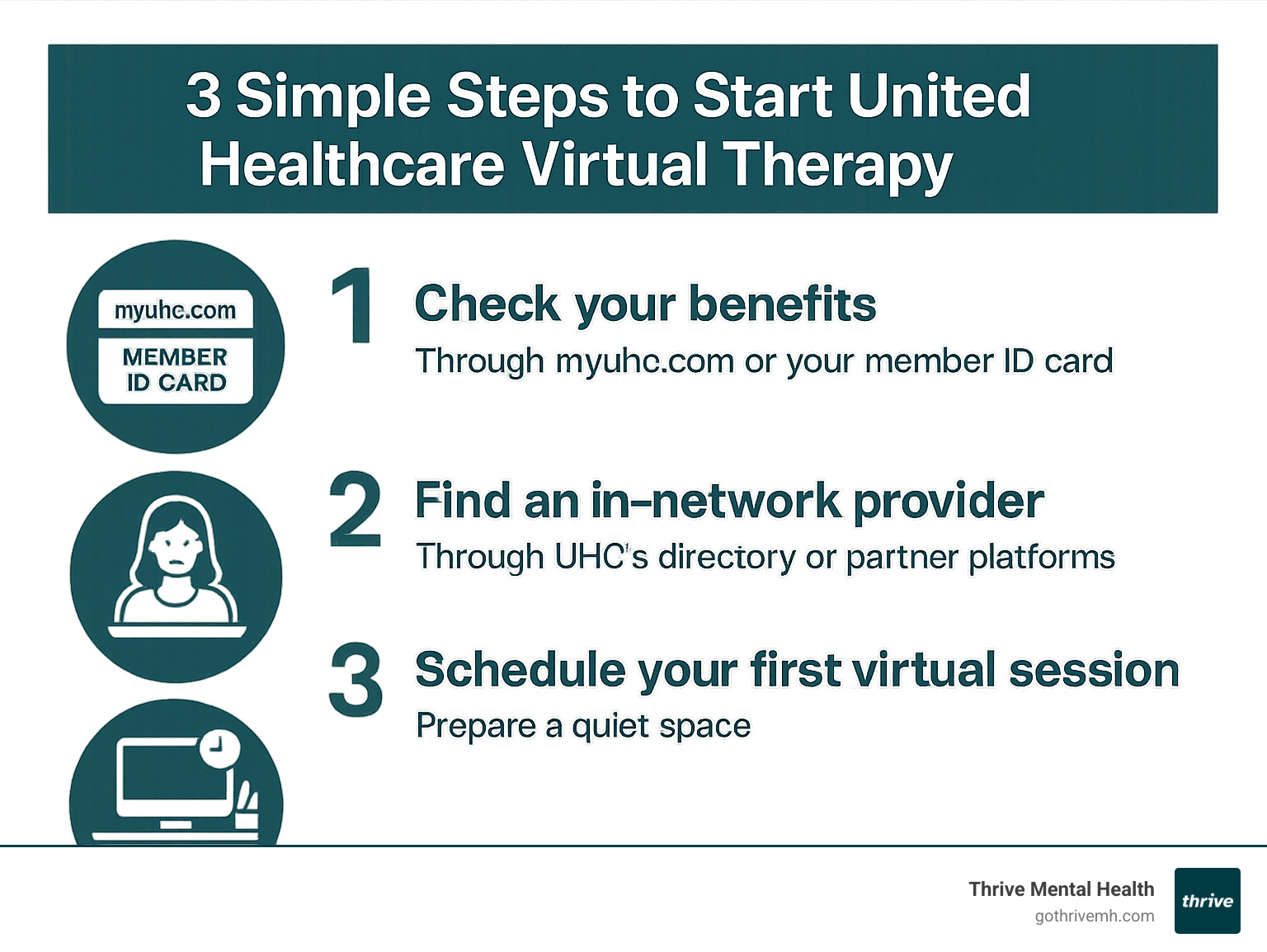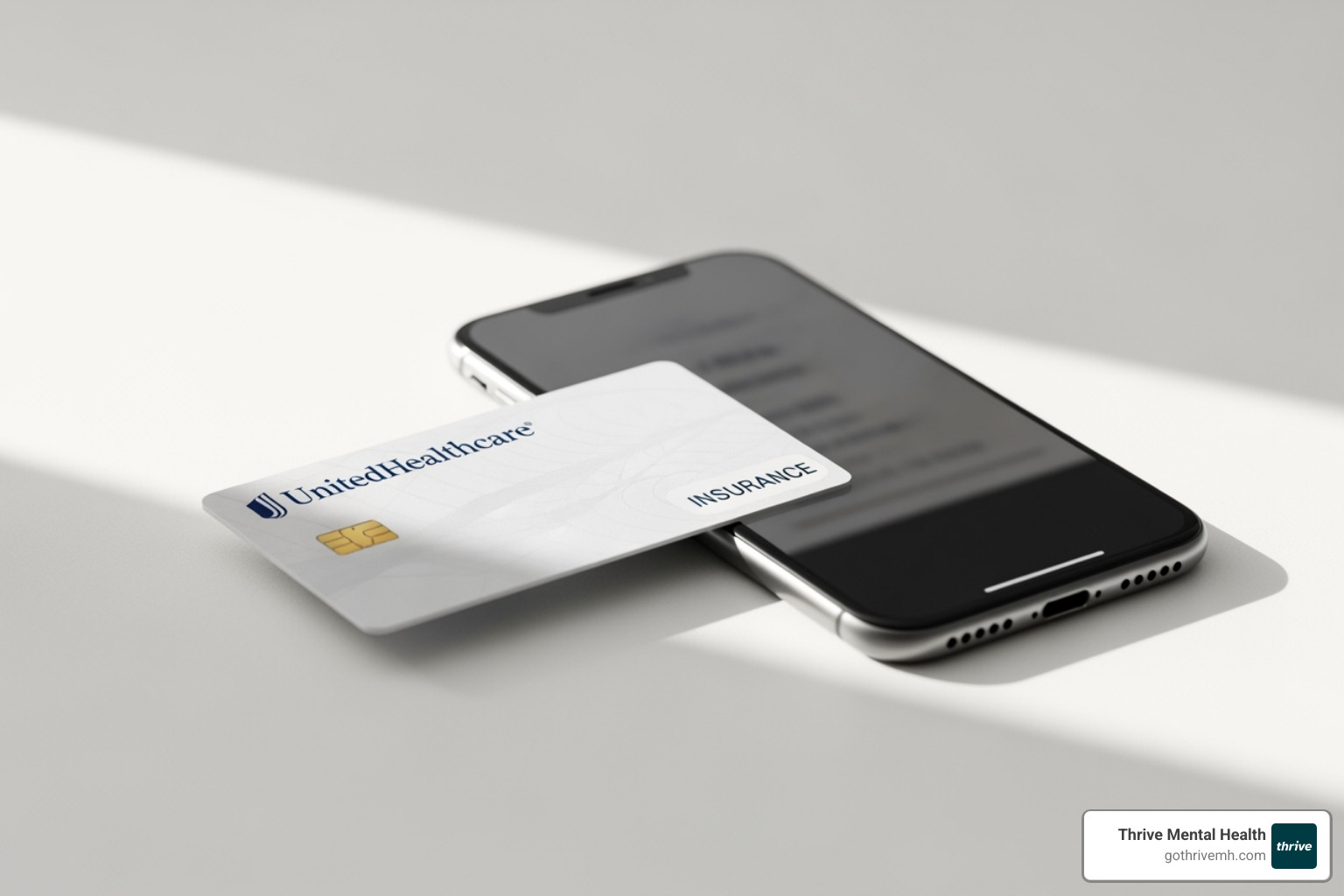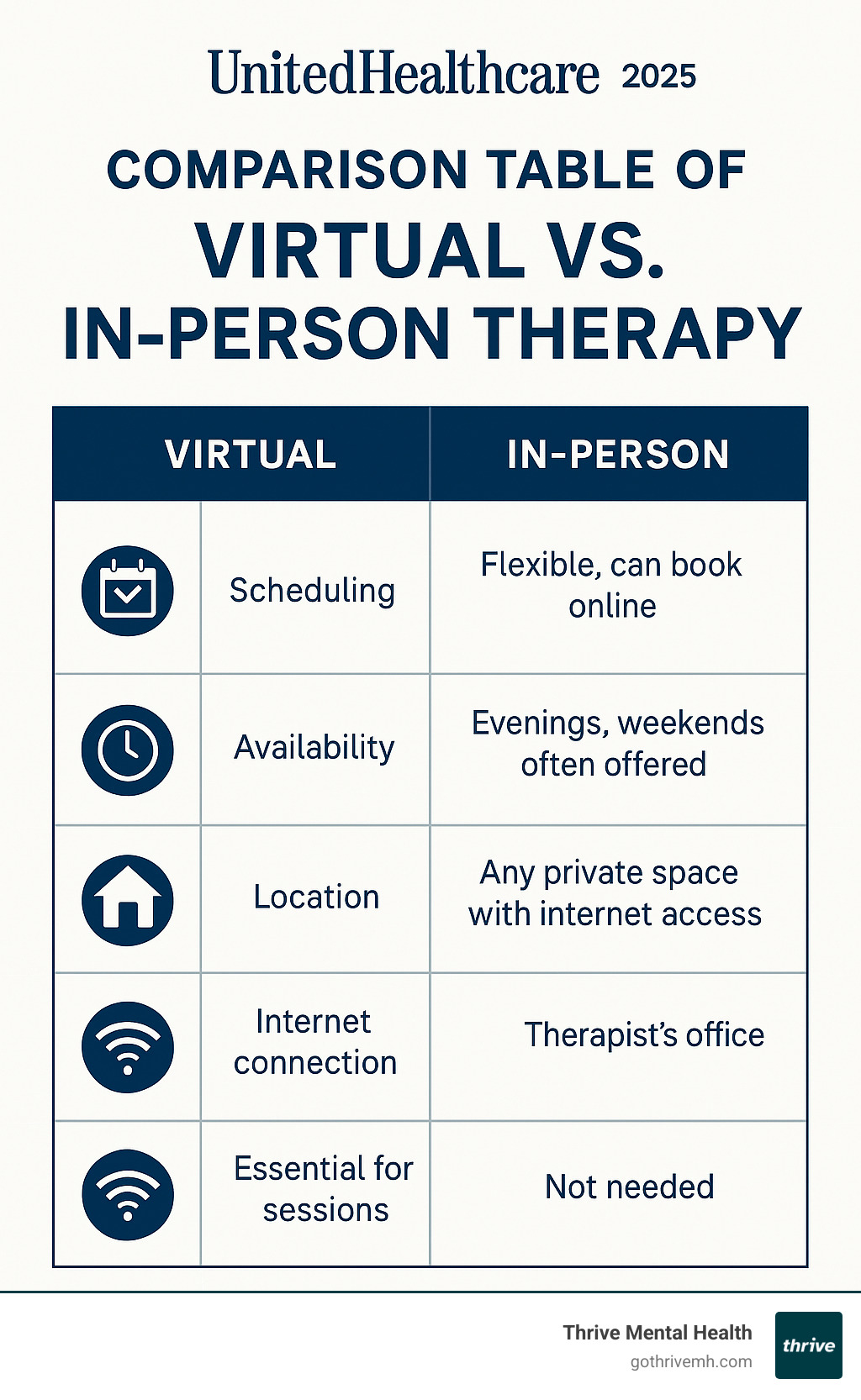United Healthcare Virtual Therapy: Pajamas Optional, Healing Mandatory

Why United Healthcare Virtual Therapy is Changing Mental Health Access
United Healthcare virtual therapy offers members convenient access to licensed mental health professionals from the comfort of their own homes. With over 100 million Americans now covered by telehealth services, the shift toward virtual care has made quality mental health support more accessible than ever before.
Quick Answer for United Healthcare Members:
- Coverage: Most UHC plans cover virtual therapy with typical copays ranging from $26-$40 per session
- Access: Available through your member portal, UHC app, or approved partner platforms
- Providers: Licensed therapists, psychologists, and psychiatrists in your state
- Conditions Treated: Anxiety, depression, PTSD, substance use, relationship issues, and more
- Getting Started: Sign in to myuhc.com or call the number on your member ID card
The convenience factor is undeniable. As one user shared about their virtual therapy experience: “When you don’t feel well, the last thing you want to do is go anywhere. That’s why we try to make things easier by offering virtual visits.”
Virtual therapy through United Healthcare removes traditional barriers like commute time, waiting rooms, and scheduling conflicts that often prevent busy professionals from seeking the mental health support they need. Whether you’re dealing with work stress, relationship challenges, or more complex mental health conditions, virtual sessions can provide the same quality care as in-person visits – just with pajamas optional.
I’m Nate Raine, CEO of Thrive Mental Health, where I’ve spent years helping individuals steer their insurance benefits and access quality virtual care. Through my experience guiding clients through United Healthcare virtual therapy options, I’ve seen how removing access barriers can transform someone’s mental health journey.

Understanding Your United Healthcare Virtual Therapy Options
Navigating mental health care doesn’t have to feel like decoding a secret message. When it comes to United Healthcare virtual therapy, the good news is that accessing quality care has become surprisingly straightforward – and we’re here to walk you through exactly how it works.
Think of virtual therapy as having a heart-to-heart conversation with a trusted friend, except that friend happens to be a licensed mental health professional who can actually help you work through life’s challenges. You’ll connect through your smartphone, tablet, or computer for real-time audio and video sessions that feel just as personal and effective as meeting face-to-face.
United Healthcare virtual therapy is accessible through several convenient pathways. You can log into your UnitedHealthcare member portal online, use the UnitedHealthcare mobile app, or connect through national provider networks that partner directly with UHC. For our Florida clients at Thrive Mental Health, this flexibility means you can often find local in-network providers who understand your regional context while still enjoying the convenience of virtual care.
The beauty of this system is that it eliminates those traditional barriers that keep people from getting help – no more rushing through traffic to make appointments or sitting in waiting rooms. You can have your session from your favorite chair at home, during a lunch break at work, or even from a quiet corner of your local coffee shop (though we recommend somewhere more private for obvious reasons).
For a deeper understanding of how this approach transforms the counseling experience, check out our comprehensive guide on Virtual Therapy: A Convenient and Effective Approach to Counseling.
What Services and Conditions Are Covered?
One of the most reassuring aspects of United Healthcare virtual therapy is just how comprehensive the coverage can be. Whether you’re dealing with everyday stress or more complex mental health challenges, virtual therapy through UHC typically covers a wide range of conditions and services.
Anxiety is one of the most commonly treated conditions, including generalized anxiety disorder, social anxiety, and panic attacks. Many people find that discussing their worries from the comfort of home actually helps them open up more freely. Depression treatment is equally well-supported, covering major depressive disorder, persistent depressive episodes, and seasonal mood changes.
Stress and burnout support has become increasingly important, especially as more people recognize the need for healthy coping strategies. PTSD treatment through virtual sessions allows trauma survivors to process their experiences in a safe, controlled environment where they feel most secure.
Substance use disorders receive comprehensive virtual support, helping individuals on their recovery journey access consistent care. Relationship issues can be addressed through couples counseling and family therapy sessions, though you might need to negotiate who gets the good lighting in your video call.
The coverage extends to eating disorders, providing crucial support for those struggling with disordered eating patterns and body image concerns. OCD treatment helps manage intrusive thoughts and compulsive behaviors, while bipolar disorder support focuses on mood stability and management strategies.
Beyond traditional talk therapy, UHC’s virtual options often include psychiatry services and medication management. This means you can meet with a psychiatrist for evaluations, receive diagnoses, and have your medications monitored – all through secure video sessions.
For those interested in specific therapeutic approaches commonly used in virtual settings, our guide to Online Cognitive Therapy explores how evidence-based techniques translate beautifully to the digital format.
Who Are the Virtual Providers?
When you connect with United Healthcare virtual therapy, you’re not just chatting with someone who watched a few YouTube videos about feelings. You’re working with rigorously vetted, highly qualified professionals who meet UnitedHealthcare’s strict network standards.
Licensed psychologists in the network typically hold doctoral degrees and bring years of specialized training in various therapeutic approaches. They’re skilled in both conducting thorough assessments and providing ongoing therapy custom to your specific needs.
Licensed psychiatrists are medical doctors who specialize in mental health. They can provide diagnoses, prescribe medications when needed, and offer therapy – essentially giving you access to comprehensive mental health care through your screen.
The network also includes various licensed therapists, each bringing their own expertise. Licensed Clinical Social Workers (LCSWs) combine their understanding of social systems with clinical training to help you steer both personal challenges and broader life circumstances. Licensed Marriage and Family Therapists (LMFTs) specialize in relationship dynamics, whether you’re working on your marriage, family relationships, or even your relationship with yourself.
Licensed Professional Counselors (LPCs) round out the team with their Master’s-level training in counseling techniques, offering both individual and group therapy options.
What’s particularly important for our Florida clients is that all these providers must be state-licensed to practice in Florida. This ensures they understand local regulations, cultural contexts, and ethical standards that apply specifically to your situation.
The quality standards are impressive – many platforms report that 99% of their clinicians maintain client satisfaction ratings of 4.8 out of 5 or higher, with providers averaging nine years of experience in their field. When you’re ready to find a provider who’s the right fit for your needs, you can start your search at Find a provider with Thrive Mental Health.
Navigating Costs and Insurance with Your UHC Plan
Let’s be honest – figuring out healthcare costs can feel like trying to solve a puzzle while blindfolded. But here’s the good news: United Healthcare virtual therapy doesn’t have to break the bank or leave you scratching your head about coverage.

The beautiful thing about virtual therapy through UnitedHealthcare is that it’s typically covered just like your regular in-person visits. This means your usual copays, deductibles, and coinsurance rules apply – no surprise fees or hidden costs lurking around the corner.
From what we’ve seen with our clients, most UnitedHealthcare members pay between $26 to $40 for a virtual therapy session, depending on their specific plan. Of course, your exact cost might be different, which is why checking your individual benefits is so important (more on that in just a moment).
Here’s where things get really important: in-network versus out-of-network providers. Staying in-network is like shopping at your favorite store during a sale – you’ll almost always pay less. UnitedHealthcare has negotiated special rates with in-network providers, which means lower costs for you. Out-of-network providers? Well, that’s when your wallet might feel a bit lighter.
At Thrive Mental Health, we know that understanding your coverage shouldn’t require a PhD in insurance-speak. That’s exactly why we help our Florida clients steer their benefits, especially when it comes to more intensive virtual care options. If you’re considering a higher level of support, check out our guide on Virtual IOP Insurance to understand how your UnitedHealthcare plan might cover these programs.
How to Verify Your United Healthcare Virtual Therapy Coverage
Before you dive into your first United Healthcare virtual therapy session, let’s make sure you know exactly what you’re paying for. Think of this as your insurance detective work – and trust me, it’s worth the few minutes it takes.
The myUHC portal is your best friend here. When you log in, you’ll see a personalized breakdown of your benefits that’s way more helpful than trying to decode those confusing insurance documents. You can easily sign in to your member account to check benefits and get the real scoop on your virtual therapy coverage.
Don’t feel like logging in? No problem. Flip over your member ID card – see that phone number on the back? That’s your direct line to someone who actually knows what they’re talking about. These Member Services folks can walk you through your copays, tell you if there are session limits, and confirm which virtual platforms are covered under your plan.
The UnitedHealthcare app is another gem that puts your benefits right in your pocket. You can check coverage, find in-network providers, and sometimes even start a virtual visit without ever leaving the app. It’s like having a healthcare concierge on your smartphone.
If you’re the type who likes to read the fine print (and honestly, good for you), your plan documents have all the nitty-gritty details. Look for your Summary of Benefits and Coverage or Evidence of Coverage – these spell out exactly what’s included with your telehealth benefits.
Here at Thrive Mental Health, we get it – insurance verification can feel overwhelming. That’s why our team is here to support you through the process. We can help you understand your UnitedHealthcare benefits and figure out how they apply to our virtual programs. After all, getting the mental health support you need shouldn’t come with a side of insurance headaches.
Your Step-by-Step Guide to Accessing Care
Taking your first steps toward mental health support through United Healthcare virtual therapy doesn’t have to feel like navigating a maze. At Thrive Mental Health, we’ve watched countless individuals transform their lives by simply knowing where to start. Think of this as your friendly roadmap to healing – one that meets you exactly where you are, whether that’s in your favorite chair at home or tucked away in a quiet corner of your office.

The beauty of virtual therapy lies in its simplicity. You’re just three straightforward steps away from connecting with a licensed professional who can help you work through whatever you’re facing. And for those who might benefit from more structured support, our Telehealth Therapy Outpatient Programs offer comprehensive care that fits seamlessly into your daily routine.
Step 1: Find the Right Provider for You
Finding the right therapist is a bit like dating – except instead of wondering if they’ll split the dinner bill, you’re hoping they’ll help you split open your emotional growth potential. The good news? UnitedHealthcare makes this process much more straightforward than modern romance.
Your UHC member portal at myuhc.com is your best starting point. Once you’re logged in, head to the “Find a Provider” section and filter specifically for mental health professionals who offer virtual care. You can narrow your search by the type of provider you’re seeking – whether that’s a therapist for talk therapy, a psychologist for more specialized treatment, or a psychiatrist if you think medication might be helpful.
At Thrive Mental Health, we understand that finding the right fit is crucial for your healing journey. While our specialty lies in intensive outpatient and partial hospitalization programs for Florida residents, we’re always here to guide you toward the virtual therapy resources that align with your specific needs within the UnitedHealthcare network.
When you’re browsing potential providers, take time to read their bios carefully. Look for therapists who specialize in what you’re dealing with – whether that’s anxiety keeping you up at night, relationship challenges, or work stress that’s following you home. Many providers share their therapeutic approaches, like Cognitive Behavioral Therapy or mindfulness-based techniques, which can help you choose someone whose style resonates with you.
Consider your personal preferences too. Do you feel more comfortable talking with someone of a particular gender? Would you prefer a therapist who shares your cultural background or has experience with your specific life stage? These details matter more than you might think – therapy works best when you feel genuinely understood and safe.
Step 2: Schedule Your First Appointment
Once you’ve found a provider who seems like a good match, scheduling your first session is refreshingly simple. Most virtual therapy providers have acceptd online scheduling systems that let you book appointments at your convenience, often directly through their websites or the UnitedHealthcare app.
One of the beautiful advantages of virtual care is provider availability. Many therapists offering online sessions have more flexible hours than traditional in-person practices. This means you might find evening appointments that work after your demanding job, or weekend slots that don’t require taking time off work.
After you schedule, expect a confirmation email with all the important details. This typically includes the secure video link for your session, any intake forms you might need to complete beforehand, and clear instructions about how to access the platform. Most virtual therapy platforms prioritize user-friendly technology – you won’t need a computer science degree to join your session.
For those considering more intensive support, a Virtual Intensive Outpatient Program can provide structured care that fits around your schedule. Learn more about The Benefits of a Virtual Intensive Outpatient Program (VIOP) to see if this comprehensive approach might be right for you.
Step 3: Prepare for Your First United Healthcare Virtual Therapy Session
You’ve done the hard part – finding your provider and booking that first appointment. Now let’s set you up for success so your United Healthcare virtual therapy experience feels comfortable and productive from the very start.
Creating the right environment is essential. Find a quiet, private space where you can speak openly without worrying about interruptions or eavesdropping roommates. This might be your bedroom, a home office, or even your car if that’s where you feel most secure. The goal is finding somewhere you can be authentically yourself.
Technology hiccups can derail even the most meaningful conversations, so do a quick device check beforehand. Test your camera and microphone, ensure your internet connection is stable, and make sure your phone, tablet, or computer is fully charged. A quick test call with a friend can save you from technical stress during your actual session.
While you don’t need to prepare a formal agenda, jotting down a few questions or topics you want to discuss can be incredibly helpful. Maybe you’re wondering about coping strategies for work stress, or you want to explore why certain relationships feel so challenging. Having these thoughts organized can help you make the most of your time together.
Most importantly, approach your first session with an open mindset. Your therapist isn’t there to judge your choices or fix you like a broken appliance – they’re there to support your own journey toward healing and growth. The more honest and open you can be, the more helpful the experience will become.
Starting therapy is an act of courage and self-care. You’re taking control of your mental health, and that’s something to feel proud of, not anxious about.
The Pros, Cons, and Extra Tools for Your Journey
United Healthcare virtual therapy offers a wealth of advantages that are changing how people access mental health care. However, like any tool, it also has its limitations. Let’s weigh the benefits and consider when it might not be the ideal solution.
Key Advantages and Benefits:
- Accessibility: Virtual therapy breaks down geographical barriers. For those in rural areas of Florida or those with mobility challenges, it brings quality care right to your doorstep.
- Convenience: No commute, no parking, no waiting rooms. You can fit sessions into your busy schedule more easily, whether it’s during a lunch break or after the kids are asleep. As we like to say, pajamas optional!
- Privacy: For many, the ability to receive therapy from a private space like home improves feelings of security and confidentiality. This can be especially helpful for individuals who feel uncomfortable being seen entering a mental health clinic.
- Reduced Stigma: The discreet nature of virtual therapy can make it easier for individuals to seek help without fear of judgment, encouraging more people to prioritize their mental well-being.
- Effectiveness: Research consistently shows that online therapy is as effective as, if not more effective than, traditional in-person therapy for many conditions. For instance, studies have found higher percentages of clients experiencing clinically significant change in online therapy settings compared to face-to-face. This is why we wholeheartedly believe in the power of virtual care. You can dig into the research further at Research shows online therapy is effective.
To illustrate these points, let’s look at a quick comparison:

When Virtual Therapy Might Not Be the Best Fit
While virtual therapy is incredibly versatile, it’s not a one-size-fits-all solution. There are certain situations where in-person care or immediate emergency services are more appropriate:
- Severe Mental Illness: For complex or severe mental health conditions that require intensive, in-person monitoring or specialized interventions, virtual therapy might not provide the necessary level of care. Our virtual IOP and PHP programs at Thrive Mental Health are designed for high-acuity needs, but even then, some individuals may benefit from local, in-person support.
- Crisis Situations or Suicidal Ideation: If you are experiencing an immediate mental health crisis, have active suicidal thoughts, or are in danger of harming yourself or others, virtual therapy platforms are not equipped for emergency response. In these instances, it’s crucial to seek immediate help.
- Lack of Technology or Unstable Internet: Reliable internet access and a suitable device (smartphone, tablet, or computer with camera/microphone) are essential. Without them, consistent virtual sessions become challenging.
- Need for In-Person Connection: Some individuals simply prefer or benefit more from the direct, physical presence of a therapist. For them, the nuances of body language and the shared physical space of an in-person session might be more conducive to their healing process.
If you are in a crisis situation, please remember that immediate help is available. You can Call or text 988 for immediate help. This national lifeline provides 24/7, free, and confidential support for people in distress, prevention and crisis resources for you or your loved ones.
Exploring Additional UHC Resources
Beyond direct virtual therapy sessions, UnitedHealthcare offers a robust ecosystem of mental health resources and support programs designed to complement your care and promote overall well-being. At Thrive Mental Health, we encourage our clients to explore these additional tools to improve their mental health journey.
Many UnitedHealthcare plans provide access to:
- Digital Wellness Apps: Some plans include access to wellness apps offering mindfulness and meditation content, sleep stories, and guided programs. These apps can be excellent complementary tools to your therapy sessions, providing tools for managing stress, anxiety, and depression through cognitive behavioral therapy techniques, mood tracking, and guided meditations.
- Employee Assistance Programs (EAP): If your UnitedHealthcare plan is through your employer, you likely have access to an EAP. These programs often provide a limited number of free counseling sessions, financial and legal advice, and other support services that can indirectly benefit your mental health.
- Educational Resources: UnitedHealthcare’s member portals and websites are rich with articles, videos, and webinars on various mental health topics, offering insights into conditions, coping strategies, and overall well-being.
At Thrive Mental Health, we also offer our own digital resources and support to complement your journey, especially for those enrolled in our virtual IOP and PHP programs. We believe in providing holistic support that extends beyond just therapy sessions. For a broader understanding of the mental health resources available to you, consider exploring our guide on Exploring Mental Health Resources with UnitedHealthcare.
Conclusion: Take the Next Step Toward Healing
United Healthcare virtual therapy has truly transformed how we approach mental health care, breaking down barriers that once kept people from getting the support they needed. Throughout this guide, we’ve explored how this innovative approach works, the comprehensive range of conditions it addresses, and the qualified professionals ready to support your journey.
The benefits are clear: you can access quality care from anywhere, skip the commute and waiting rooms, and maintain your privacy while getting the help you deserve. It’s empowering to know that healing is now more accessible than ever before, fitting into your life rather than forcing you to rearrange everything around it.
For our Florida residents who may need more intensive support than traditional weekly therapy sessions, Thrive Mental Health offers specialized virtual intensive outpatient (IOP) and partial hospitalization (PHP) programs. These structured programs provide expert-led, evidence-based care that’s custom to your specific needs – all while working seamlessly with your UnitedHealthcare benefits.
Whether you’re dealing with anxiety that’s affecting your work performance, depression that’s making daily tasks feel overwhelming, or any other mental health challenge, you don’t have to face it alone. The combination of UnitedHealthcare’s extensive virtual therapy network and Thrive Mental Health’s specialized programs means you have options that can truly make a difference.
Your mental health journey is uniquely yours, and there’s no “right” way to seek support – only the way that works best for you. Don’t let uncertainty about insurance coverage or the process itself keep you from taking that first step. You deserve to feel better, and the tools to get there are more accessible than ever.
Ready to explore your options? For comprehensive guidance on making the most of your UnitedHealthcare benefits for mental health care, visit our resource on Navigating Mental Health Support with UnitedHealthcare. Your path to wellness starts with a single step – and that step can happen right from your own home.
